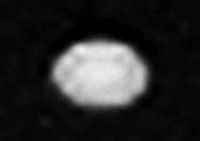Despina (moon) facts for kids
 Despina as seen by Voyager 2 (smeared horizontally) |
|
| Discovery | |
|---|---|
| Discovered by | Stephen P. Synnott |
| Discovered in | July 1989 |
| Orbital characteristics | |
|
|
|
| Semi-major axis | 52 526 ± 1 km |
| Eccentricity | 0.0002 ± 0.0002 |
| Orbital period | 0.33465551 ± 0.00000001 d |
| Inclination | 0.216 ± 0.014° (to Neptune equator) 0.06° (to local Laplace plane) |
| Is a moon of | Neptune |
| Physical characteristics | |
| Dimensions | 180×150×130 km |
| Mass | ~2.1×1018 kg (based on assumed density) |
| Mean density | ~1.2 g/cm3 (estimate) |
| Rotation period | assumed synchronous |
| Axial tilt | ~zero presumably |
| Albedo (geometric) | 0.09 |
| Surface temp. | ~51 K mean (estimate) |
| Atmosphere | none |
Despina or Neptune V is the third closest moon to Neptune. It is named after Despina, a nymph who was a daughter of Poseidon.
Despina was found in late July 1989 from the images taken by the Voyager 2 probe. It was given the designation S/1989 N 3.
Despina is not a sphere and shows no sign of any geological changes.
Images for kids
See also
 In Spanish: Despina (satélite) para niños
In Spanish: Despina (satélite) para niños

All content from Kiddle encyclopedia articles (including the article images and facts) can be freely used under Attribution-ShareAlike license, unless stated otherwise. Cite this article:
Despina (moon) Facts for Kids. Kiddle Encyclopedia.

